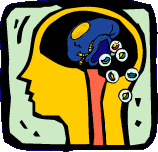 by Steven H. Horne, RH (AHG)
by Steven H. Horne, RH (AHG)
When I was in elementary school I had a collection of marbles. My favorite marble, because it was so different from the others, was a black and white striped one that I named “speedy-speed.” Although I liked my marbles, I didn’t actually play the game of marbles very often. For those of you unfamiliar with the game, you have a circle on the floor and you use your marbles to try to “shoot” or knock other marbles out of the circle. You get to keep marbles you knock out. If your marble gets stuck in the circle and someone else shoots it out, you lose it.
I didn’t like the game of marbles because I lost my second favorite marble in a game. So, I decided to be more careful with my marbles because I really wanted to keep the marbles I had.
Now, I’m 53, and while I don’t have the marble collection I had as a kid, I still want to keep my marbles. Of course, I’m talking about mental marbles, as in maintaining a sound mind. In fact, I’m a little greedy when it comes to mental marbles—I want as many as I can get!
With the rising problems with Alzheimer’s and dementia among the elderly, many people besides me are concerned about keeping their marbles. However, focusing on the negative—in this case avoiding losing your marbles (memory)—is not productive. Focusing on the positive—as in increasing your brainpower—is what will really get you what you want. And, it is possible to increase your brainpower.
Most of us assume that our intelligence is something that is fixed. We think that some of us are smarter and some of us are just plain dumber, but this is simply not the case. It’s true that all of us are talented in different ways, but most of us are quite capable of learning just about anything we want to. The idea that we can’t is a warped belief, usually brought on by parents or the intellectual damage done by the public school system.
We are a lot smarter than we think we are. Unfortunately, most people don’t access this extra mental capacity simply because they don’t believe it is there.
Well, I do! And the goal of this article is to teach you how to tap into your extra brainpower and start using it.
As is my typical pattern, I’m going to divide this topic into two parts. The first is more physical and has a lot to do with nutrition. The second is psychological and deals with how we approach learning something. So, let’s get started by talking about how to supply the brain with what it needs to generate more mental marbles for us.
 Mental Marble Enhancing Idea #1:
Mental Marble Enhancing Idea #1:
Get Water on Your Brain
Interestingly enough, some of the clues as to how you can feed your brain better are found in the insults we use to criticize someone’s intelligence. For example, “water on the brain,” is a very good thing as your brain is mostly water. Dehydration will interfere with your ability to think clearly. So, while caffeine may seem like a good idea to stimulate your mind, the fact that caffeinated beverages tend to dehydrate you shows they aren’t all that good for having a clear mind. Drinking ample amounts of water (at least .5 ounces per pound of body weight) will help keep your thinking clear.
 Mental Marble Enhancing Idea #2:
Mental Marble Enhancing Idea #2:
Become a “Fat Head”
Being a “fat head” is also a good thing, as the dry weight of the brain is over 50% fat. Children’s intelligence suffers when children are raised on a low fat diet because their developing brains crave fat. This is why kids love fatty foods. Unfortunately, we’re feeding our children (and ourselves) the wrong kinds of fats.
The brain is primarily composed of omega-3 fatty acids. These are abundant in pastured (grass-fed) animal foods, including grass-fed beef, wild game, eggs and meat from pastured chickens and dairy products from grass-fed cows (as long as these products aren’t homogenized or ultra-pasteurized).
Deep ocean fish like wild salmon, sardines, etc. are also great sources of omega-3 fatty acids and are particularly good for the brain because they contain an omega-3 fatty acid called DHA which makes up a large portion of brain tissue. (So, if you want to be smarter than the next guy or gal, there should be something “fishy” about you.) Sushi is really good for your brain (just eat the pickled ginger and wasabi and take a black walnut capsule to avoid parasites).
Flax seeds, walnuts and avocados are also good sources of omega-3s and good brain foods. Walnuts, in particular, have long been considered a brain food because the nut looks like a brain.
 Mental Marble Enhancing Idea #3:
Mental Marble Enhancing Idea #3:
Be a “Meat Head” (Especially for Breakfast)
It’s also a good idea to be a “meat head.” Protein foods are also good for the brain because neurotransmitters are made from amino acids. I’ve observed that people on low protein diets are often mentally dogmatic and rigid. They lack mental flexibility and often suffer from mood disorders (such as getting very angry and upset over the idea that they need more protein in their diet).
Of course, here again, it’s the quality of the protein you’re getting that makes a difference. An overcooked piece of cheap beef from a feedlot cow raised on commercial feed isn’t going to do the trick. Look for organic, preferably “grass fed” animal proteins and don’t overcook them—it not only denatures their proteins, they don’t taste as good.
Protein is especially important at breakfast time because that’s when your hydrochloric acid is highest and protein is easiest to digest. Studies show that people who have protein foods for breakfast instead of just carbs (coffee and donuts or breakfast cereals) perform better at mental tasks.
A good way to supplement amino acids for brain function is to use spirulina, sun chlorella or blue-green algae supplements such as Super Algae. If you don’t want animal protein, try some kind of protein powder in a breakfast shake. I’d go for whey protein over soy protein. Recently, I found a rice and pea protein powder that works great for me. I make a breakfast shake with it and some frozen berries and yoghurt whenever I’m not in the mood for a heavier breakfast.
 Mental Marble Enhancing Idea #4:
Mental Marble Enhancing Idea #4:
Get Complex (Carbs That Is)
When it comes to sharing information, I like to follow the KISS rule (“Keep it Simple, Steven”), but when it comes to carbohydrates, I like things to get complex. In fact, the single most important thing you will ever do to increase your mental clarity is to get rid of the simple carbs in your diet. Completely! Yes, you heard me, completely!
Many years ago, an iridologist told me that I was “pre-diabetic.” Something about what she said rang true for me and I decided that I didn’t want to end up being a diabetic. So, I gave up refined carbs completely, cold turkey! I stopped eating refined sugar and white flour and started eating only whole grains and natural sweeteners like raw honey and maple syrup.
It was really hard for about three weeks. I had never appreciated what it must be like for someone to quit smoking or drinking until I gave up refined carbs. I went through massive withdrawal symptoms and fought severe cravings, but I succeeded.
The most interesting thing was that I felt like my brain was coming out of a fog. It was like a light turned on in my head and I could think more clearly than I’d ever been able to think in my entire life. Many of my best insights into healing and life came during the time when I was completely off the refined carbs.
Unfortunately, some years back I “fell off the wagon” and started allowing little bits of refined sugars and white flours back into my diet. The social addiction is much harder to fight than the physical addiction because you feel like such an outsider when everyone else is eating it.
I notice, however, that when I eat those foods that my brain quickly “fogs up” again. I don’t think as clearly and my mind isn’t as sharp. So, I’m learning to socially resist these foods (especially at Nature’s Sunshine Conferences and Conventions). It has helped sitting with Dr. Hugo Rodier at conferences and watching him completely avoid the desserts and sugary foods. He is as strict about avoiding this stuff as I used to be, which makes me feel less alone in my determination to completely avoid these foods.
Foods that are a problem here include refined sugar, high fructose corn syrup, glucose, white flour, white bread, most pasta and polished white rice. Alcohol also fits into this pattern because it acts like a refined carb in the system.
When I think of my own experience of how clear my mind gets when I avoid simple carbs and how fuzzy my thinking gets when I eat simple carbs, I wonder how anyone in our society is able to think clearly. Add the various drugs people take for their health problems and I can understand why all kinds of crazy things are happening in our society—most people have “junk food” brains!
 Mental Marble Enhancing Idea #5:
Mental Marble Enhancing Idea #5:
Don’t Poison Your Mind
Before we move onto the psychological part of learning how to increase our mental marbles we need to talk about protecting our brain from toxins. There are many substances that can damage the nervous system, including drugs, alcohol and environmental toxins like lead, mercury and petrochemical solvents (gasoline, spot removers, glues, dry cleaning solutions, etc.)
Alcohol is a big cause of brain damage. Alcohol kills brain cells. So, either don’t drink at all, or only drink occasionally in small amounts, preferably with food.
Avoid drugs of all kinds, both prescription and recreational. Brain scans show that these substances can cause deterioration of brain cells.
Reduce exposure to chemicals. Drink purified water. Avoid food additives. Use non-toxic household cleaning products and personal care products. Avoid beauty parlor chemicals, dry-cleaning chemicals, carpet cleaning chemicals, paint fumes, etc. When exposed to these substances, take products to help the body detoxify from them, such as Milk Thistle Combo, All Cell Detox, fiber and good fats. Do a periodic cleanse and take antioxidants regularly.
I think that covers the basics of what we need to create a healthy brain nutritionally. Now let’s talk about some attitude adjustments and behaviors that will also increase our mental marbles.
 Mental Marble Enhancing Idea #6:
Mental Marble Enhancing Idea #6:
Be a Curious Cat
Curiosity may kill cats (although I’ve personally never seen it happen), but curiosity is not going to kill our brain cells. In fact, it does exactly the opposite. Being curious—that is, interested in learning about things—is a good quality that keeps the mind young and active.
We all start out life being curious. Nobody had to “force” or “bribe” us to learn to walk and talk. We decided to learn these skills on our own. As children, just about all of us were naturally curious, informational “sponges” anxious to soak up as much knowledge as we could.
Research shows that most children entering kindergarten love to learn, but most teenagers graduating from high school have come to hate learning. What happened? Obviously, the forced instruction of public education turns learning from a natural, fun experience that satisfies curiosity and interest, into a boring, stressful experience that most people want to avoid.
Unfortunately, this isn’t good for our brains. The brain, like our muscles, gets healthier when it is regularly exercised, and exercise for the brain is learning something new.
Even if they do engage in learning things, most adults tend to stick with fields of study they have already mastered and tend to read stuff that agrees with what they already believe. This basically keeps their brains stuck in mental “ruts” and “boxes.” If you want to develop more mental marbles, study something new and read things that present new information that challenges your existing beliefs about things. This will actually form new neural pathways in your brain and increase your intelligence and creativity, but it requires that you reawaken your childhood curiosity.
I am fortunate that I made a decision in junior high school (after some very stressful run-ins with teachers) that I wasn’t going to let school interfere with my education. I’ve kept that pledge to myself and have become a life-long learner as a result. I regularly get curious about new fields of study and I also regularly read books that challenge my current paradigms. (I call them “paradigm-busting books” and I’m creating a list of my favorites at www.steven-horne.com.)
Just as an example, here is a partial list of topics I’ve read books about, listened to audio CDs or watched DVDs about in the past two years:
- The biological differences between men and women
- The biography of Hershey (who started the Hershey chocolate company)
- New archeological insights into the Americas before Columbus
- How to read body language
- Marketing and business
- Organic chemistry
- The Summerhill School in England (where lessons were voluntary and children helped make the rules through a Democratic process)
- Spirituality and religion (I read books on a wide variety of spiritual perspectives and points of view.)
- Cooking techniques
- Gardening
- Russian language and culture
- Psychology
As you can see, I’m a curious cat, and if you want to increase your mental marbles, you should be, too. When you challenge your brain by developing new interests, you not only develop more connections between your brain cells, you also become more creative and flexible in your thinking. It also makes you more tolerant of others.
 Mental Marble Enhancing Idea #7:
Mental Marble Enhancing Idea #7:
Learn Like a Kindergartner
One of the reasons people lose their love of learning is because we make learning so stressful. The brain is designed to help us blot out unpleasant memories, so when we are stressed, we have a harder time learning.
On the other hand, pleasant experiences help store information into long-term memory faster. Bright colors, music, games and other learning tools we use with kindergartners and preschoolers work on adults, too. In fact, we’d all learn a lot better if we continued to use the tools we used in kindergarten to learn throughout our life.
When you’re learning something new, play with it. Make the information fun. Take notes with bright colored markers. Draw pictures. Make up a song about what you are learning. Act it out. Put on classic instrumental music while you’re studying (it has been shown to enhance memory). Make a game out of it. All these things will increase your retention of material two or three fold.
In contrast, if you make learning into work, get stressed over it, beat yourself up about it and otherwise turn it into a negative experience, you will greatly interfere with your ability to learn. This leads directly into the next tip for increasing the number of mental marbles you possess.
 Mental Marble Enhancing Idea #8:
Mental Marble Enhancing Idea #8:
Make Lots of Mistakes
One of the reasons adults don’t like to venture into new areas of study is that you always make lots of mistakes when you’re learning something new and challenging. Public education drills into us the idea that making mistakes is “bad.” It’s a strange notion because nobody learns anything new without making a lot of mistakes. You fell many times in learning to walk and you babbled a lot in learning to talk.
One of the things I’ve noticed about many people is they suffer a sort of paralysis about the idea that they might do something “wrong.” They are afraid to try some herb or supplement because they might have a bad reaction to it. Or, they are afraid to start helping people because they feel like they don’t know enough.
The problem is that book learning isn’t really learning. Books only give us abstract, symbolic ideas. I can read a lot of cookbooks, but I won’t learn to cook unless I start actually making stuff in the kitchen. If I’m not used to cooking, I may burn something, season it wrong or otherwise mess it up, especially, if I’m trying a very difficult cooking procedure. However, I won’t ever be able to cook if I don’t go through this process. The key is to learn to enjoy your mistakes instead of beating yourself up for them.
While it may seem contrary to what you’ve been led to believe, people who achieve the most in this life are people who have made a lot of mistakes. People who are overly cautious and conservative usually don’t discover anything great. It’s the person who steps outside their intellectual box and jumps out of their mental rut who is likely to win the mental marbles game. I’ve written an article about this entitled “The Incredible Value of Mistakes” which is available at www.steven-horne.com..
I hope you’ll follow my example and start doing things where you get to make some great mistakes. You’ll definitely acquire more mental marbles if you do.
 Mental Marble Enhancing Idea #9:
Mental Marble Enhancing Idea #9:
Get Off the Bell Curve
The public education system uses a “bell curve” model for grading. The “bell curve” model is based on the idea that some students are really smart, most students are average, and some at the bottom are stupid. This is a completely false way to view intellect.
I was fortunate enough to participate in an experimental class in learning and teaching my final semester in college. I was also working as an undergraduate research assistant in the Instructional Science department as my original intent was to get a Master’s Degree in Instructional Media. There, I was exposed to ideas that forever changed my concept of learning and teaching.
For one thing, I learned that there are over 100 aptitudes that can be measured with testing and that if you administer the full battery of aptitude tests to any group of people, that everyone tests as a genius in at least one and often two or three areas. So, all of us have outstanding skills in at least some areas. In other words, there are many different kinds of intelligence and everybody is a genius at something.
By forcing a “bell curve” model and assigning grades to students, the school system has caused some people to think they are “slow” or “stupid” when it comes to learning. This really isn’t true. If you struggled with a particular subject, (math, reading, science, spelling, etc.) you may have just been in a position at that time in your life where you weren’t ready to master that subject. Often, if the system could have just waited another six months or a year, you would have learned it without a struggle. Our brains develop different areas at different speeds, but the fact is that most of us are capable of learning just about anything and we’re functioning far below our natural aptitude because we’ve absorbed the negative ideas of others.
Jump off the bell curve and stop comparing yourself to other people. I’m trying to learn some Russian and I’m terrible at Russian because I’m in the early stages of learning. Whenever you venture into a new field, you’re going to be terrible at it at first. This doesn’t mean you’re dumb. Don’t compare yourself to other people; instead, celebrate your own progress! You should pat yourself on the back for every step you take, no matter how small the progress has been. When you encourage yourself for making progress, you’ll find that you can probably master just about anything you want to. And, even if you don’t master something, the effort of even working at it will give you more neurological connections in your brain cells and enhance your overall intelligence. In other words, you can’t lose!
 Mental Marble Enhancing Idea #10:
Mental Marble Enhancing Idea #10:
Let’s Get Physical
One of the topics I mentioned I’d studied in the last couple of years was the Summerhill boarding school in England, where students were not required to come to classes. In other words, they weren’t forced to learn. Interestingly enough, most kids eventually attended classes voluntarily without being compelled to, which shows most of us have a natural love for learning. What is interesting though is that the most well attended classes were shop and art classes.
In our early years, especially between birth and age eight, most of our brain development occurs through neuromuscular activity, that is, crawling, walking, running, tasting things, smelling things, touching things, etc. In fact, studies have shown that watching TV when we are young inhibits rather than enhances intelligence because it is a passive activity, which does not develop the brain.
Dyslexia occurs in children because they did not crawl enough or otherwise stimulate the development of brain communication through physical activity. Brain Gym, a system of physical activities that helps overcome dyslexia and learning disabilities, shows that movement can enhance learning and intelligence. You can learn more about how to overcome problems like dyslexia through physical movement by purchasing my Holistic Solutions to Learning Problems DVD set.
All of this makes it a shame that in an attempt to “improve the intelligence of our children,” governments have been cutting funding to gym, dance, shop and art classes in favor of more “academic” programs. This actually diminishes development of the brain rather than enhancing it.
Physical activity not only stimulates the development of neuropathways in the brain, it also stimulates circulation to the brain, which enhances brain function and memory. So, if you want to increase your brainpower, also try learning new physical skills—painting, pottery, dance, playing an instrument, learning a new sport, etc. The physical activity will send more blood to your brain and getting movement involved will develop more neural connections to increase your mental marbles.
With all these ways to increase our mental marbles, there is no reason for any of us to “lose our marbles” as we grow older. For more ideas on how to keep your mind and memory sharp, view this month’s Herbal Hour DVD, Brain Power: Tips for Tuning Up Your Mind and Memory.

